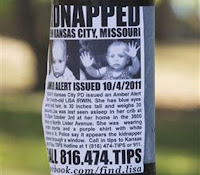No Tears for Isabel
Six-year-old Isabel Celis was last seen at approximately 11:00 p.m., on Friday, April 20, 2012. She was discovered missing around 8:00 a.m., on Saturday, April 21. Isabel’s parents called 911 as soon as they determined that she was not in the family home. The case has since captured the attention of the nation; however Isabel’s family has made only one public appearance to speak out on behalf of their missing daughter.
I’m a firm believer that families are the best advocates for their missing children. If there is a perception that Isabel’s family is not doing everything that they can to help their young daughter it creates concern within the community. They have to wonder, “If the family is not doing everything that they can, then why should I do everything that I can to recover this child?”
At one point after my daughter was kidnapped a news reporter told me that she could get Polly more attention with fifteen seconds on the evening news than I could generate nailing flyers onto telephone poles for a hundred years. I took that to heart and have rarely turned down an interview since. My advice to Isabel’s parents is to get out there and start fighting for your child.
Get over your fears, realize that you always told her that you would be there when she needed you, and that she’s never needed you more than she needs you right now. Therefore, get out there and give the interviews: create a portrait of Isabel. Tell us what kind of a girl she is. Let us know what she likes and what she doesn’t like. Start sharing more photographs and share video of her. Build her up in the public’s mind so that they become invested in who this little girl is and demand that law enforcement do whatever they need to do to bring her home. Involve yourself in the community of hope that has sprung up around you, is supporting you and is fighting for Isabel’s return. Hug some folks and thank some folks. She deserves nothing less.
One of the most difficult kinds of crimes to solve is the stereotypical stranger abduction, because that scenario is about some goon crawling out from under a rock, stealing your child and then disappearing back under that rock. It’s a big world and these are very small children. Law enforcement is obviously going to investigate that scenario, but the numbers always bring you back to the family. The vast majority of kidnappings in America are non-custodial parental kidnappings. The most vulnerable population of children to that scenario are pre-teen girls. Everything about this case will continue to turn right back onto the family until they eliminate themselves as suspects. The best way to do that is to submit to any questioning, to submit to any polygraphs and to get out there on the airwaves and advocate on behalf of Isabel.
Look at what happens when you don’t do that. Take the case of baby Lisa Irwin, who disappeared from her bed in Kansas City, MO on October 3, 2011. Lisa’s parents did not advocate on her behalf, they did not cooperate with the police. That case has effectively gone cold. It went cold because people thought, “Gee, if the parents aren’t going to be out there fighting for her, why should I be out there fighting for her?
Baby Lisa’s case is going cold. By not cooperating with the authorities and stonewalling the media baby Lisa’s parents have made themselves look guilty. It has allowed law enforcement to pull back their investigation. Instead of hundreds of multijurisdictional officers and agents focused on baby Lisa, now there are several.
We kept our case alive for two months because we never stopped speaking up for and representing Polly. We have a case here in Northern California for a missing teenager named Sierra LaMar that has been active for six weeks now, and there is still an enormous amount of interest in her case. However, in Isabel’s case law enforcement admitted on April 27, that the investigation has already been reduced from 200 to about 50 officers. On April 29, Tucson Police Lt. Fabian Pacheco acknowledged that the case could turn “cold.”
I think that we are looking at very limited options here. If something doesn’t pop soon. If the parents don’t change the way they are handling Isabel’s disappearance, then the case may very well go cold. The unfortunate thing about that is that people are concerned that there may be a monster loose on the streets of Tucson: first because of Isabel’s case; and then because of the more recent case of a man breaking into the home of three young sisters in the wee hours of the morning only miles away from Isabel’s home. If this goes cold and we don’t know who that monster is, then we have a situation where the people of Tucson, AZ are living in a community where the safety of children isn’t even secure in the sanctity of their own homes, and law enforcement does not have the will to resolve this public safety crisis. That creates an atmosphere of fear and the last thing we need in America is more home grown fear.
Baby Lisa’s parents have resisted the authorities attempts to re-interview Lisa’s half brothers, who were in the home when she was snatched, saying they were concerned for the boys’ well being. Tomorrow law enforcement will finally have an opportunity to re-interview the boys for the first time since she disappeared on October 3 or 4. The boys, eight and five-years-old, have only been interviewed for fifty and thirty-minutes respectively.
Wouldn’t it be to the children’s benefit to help solve the case rather than have suspicion focused on the family and an evil mystery lingering over their heads forevermore? Little boys long to be Batman, Superman or Captain America. They fantasize about “saving the day” and rescuing the damsel in distress. Baby Lisa’s brothers will never have a better chance to turn fantasy into reality than they have right now. They need to be talking about what they do or don’t know; trying to solve the case and understanding the evil that lurked within. Only then will they be able to mature knowing that they did everything that they could to help find their little sister.
There are viable techniques for interviewing children that are gentle, non-invasive, and non-threatening. Originally developed to draw out information from child sexual abuse victims without re-victimizing them, forensic interviewing of children has broad acceptance in the criminal justice community. Typically, a specially trained interviewer will sit down with child in a comfortable, home like setting. Oftentimes interviews are videotaped, and other interested parties including law enforcement, prosecutors, medical personnel and defense attorneys monitor the interview. This is to guarantee the interviewers objectivity, ensure that he/she employed non-leading techniques and that relevant case information was not overlooked. The goal of the interview will determine levels of victimization and elicit information that will stand up in court.
Baby Lisa’s parents have circled the wagons, hired a platoon of lawyers and consultants, and cut off communications with media and law enforcement. Critical decisions are made by committee. Their other two children are off-limits to law enforcement, mommy’s story shifts and shudders, and her commentary reveals more questions than it answers. Access to the house is restricted and a cadaver dog picked up the scent of decaying human remains in the master bedroom.
The abysmal choices and questionable behavior of baby Lisa’s mom and dad have left them exposed. One result of their failure to eliminate themselves as suspects in baby Lisa’s disappearance is that her parents are being tried and convicted in the court of public opinion. They and their representatives claim that they are being scapegoated; that the authorities have to pin the crime on someone and that the parents are the obvious choices.
However, there are too many law enforcement professionals with too much experience from too many agencies for that to be true. The FBI, who has been involved since the beginning of the investigation has prioritized missing children since 1993. They have a written protocol and agents that are specifically trained in missing child investigations. Given their standing in the law enforcement community and the resource that they bring to bear on missing person cases, it would be counterproductive and reflect badly on the agency to force blame on innocent and suffering parents.
No, I believe that the family’s failure has been home grown and nurtured with ignorance and bad advice. Jeremy Irwin and Deborah Bradley’s choice to allow others to make critical decisions relevant to their daughter’s disappearance hinders the case and undermines their moral authority. It appears as if their needs take precedent over the recovery of their daughter. It replaces a sense of urgency with a need for caution.
82% of all abductions involve a family member. Therefore, once a child has been reported missing law enforcement is going to focus resource and attention on family members. To do otherwise would be irresponsible. It is in the best interest of the child, the family and the investigation for family members to fully cooperate with the authorities so that they can eliminate themselves from suspicion and allow law enforcement to focus on other possible scenarios. That is what I did, and that is what hundreds if not thousands of other parents have done when their child or children mysteriously disappear. That is not what baby Lisa’s parents are doing.
A possibly tragic but instructive situation is playing out in suburban Kansas City, Missouri right now. Initially, the case of baby Lisa Irwin garnered national attention, a massive multi-jurisdictional law enforcement response, and much sympathy for her distraught family. However, in the past 24-hours the case has changed dramatically. Baby Lisa’s case has deteriorated because her parents have made some terrible choices that have focused attention back upon themselves, and raised questions about their intent.
10-month-old Lisa Irwin was reported missing after her father came home from a late shift at work at 4:00 am last Tuesday morning. A distraught Jeremy Irwin said that, “the front door was unlocked, the windows were open, the lights were on and she (baby Lisa) was nowhere to be found.” He also said that three cell phones had been stolen off of the kitchen counter.
An Amber Alert was issued at about 7:00 am on Tuesday morning. The Kansas City Police Department is the lead agency in the investigation. Two days after baby Lisa was reported missing her mother, Deborah Bradley said that the police TOLD her she had failed a polygraph exam. Police will neither confirm nor deny that this is true. A local television station reported that the parents have made a “deal” with national media and will no longerspeak with local media outlets.
Also on Thursday, after many hours of what seemed like nonstop questioning Lisa’s father told the police that he needed a break from questioning and asked if he could leave the interrogation room. Shortly thereafter law enforcement held a press conference claiming that the family had stopped cooperating, although the family disputes that claim.
When children disappear attention always falls squarely on the shoulders of the family. This is because 82% of all abductions are family centric. Therefore, the family has to answer all questions, regardless of how tedious they seem, until law enforcement is convinced that they are innocent of wrongdoing. Only then will law enforcement be able to focus their full attention on the other possible scenarios. Those scenarios include: other family members; friends and neighbors; peripheral contacts; registered sex offenders; and finally the most ominous scenario of all – stranger abduction. If more than 300 police, search and rescue professionals and FBI agents are dedicating all of their time in the case of the missing infant, then the parents should stay on the hot seat until they are cleared of suspicion. To put their own needs ahead of baby Lisa’s recovery is pitiful and shortsighted.
All kidnappings are local events. Certain cases, such as baby Lisa’s, draw national attention. Satellite and microwave broadcasting trucks appear as if out of nowhere as miles of cable crisscross the missing child’s neighborhood. Correspondents fly in and set up live shots across the street from the family home. We get breathless reports and updates every hour on the hour. In fact, cable news outlets have come to depend upon true crime stories to drive their ratings.
For a brief moment in time baby Lisa has fulfilled America’s obsession with true crime and a good mystery. However, if there are no new developments interest will be impossible to sustain. Eventually, national media will move onto the next crime de jour. Satellite connections will be broken, antennas will telescope back down, cable will be coiled and stored and the correspondents will climb into their rental cars and fly off to their next destination. Now, the only outlet for getting the word out will be the local media. And, how receptive will they be if they were snubbed by the family seeking wider attention on the national stage?
Kidnapping is local and times are tough. Law enforcement will investigate as long as tips come in and the investigation moves forward. But, unless the public demands their full attention they will drift off to other cases and other crimes. If the parents of the missing child are not front and center on the local television screen recruiting public support, the fragile coalition of trust that includes law enforcement, media, the public and the family can crumble like a house of cards.
As bad as it looked for baby Lisa after the Amber Alert was activated, it is beginning to look even worse now.
Translate »
0












